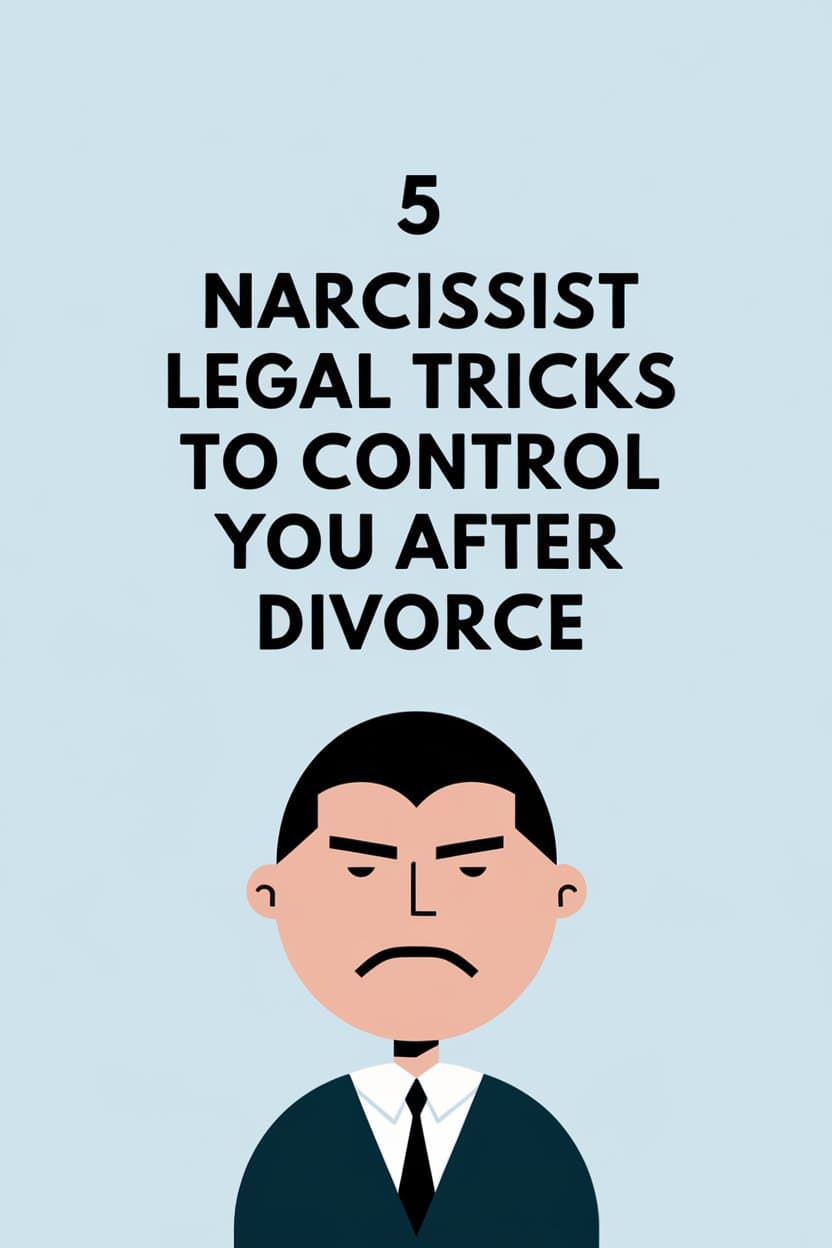Divorce from a narcissist is supposed to mean the end of their power trips and emotional acrobatics. Wouldn’t that be lovely?
Unfortunately, for many, it’s only the beginning of a whole new circus—featuring subpoenas instead of juggling pins and passive-aggressive legal emails that would make even your nosiest aunt blush.
Narcissists have a knack for turning the post-divorce landscape into their own personal chessboard. If you feel like you’re still being played, you’re not imagining things.
These folks are notorious for using the legal system as just another toy in their box of manipulative tricks.
Ready to spot their moves before they checkmate you? Here are five of the most common legal stunts narcissists pull after divorce—and, more importantly, what you can do to keep your sanity (and wallet) safe.
1. Weaponizing Custody Agreements
Ask any exhausted parent who’s co-parented with a narcissist: the ink on the custody agreement is barely dry before the bending, stretching, and outright ignoring begins.
Narcissists excel at twisting schedules to suit their whims. Picking up the kids late, dropping them off early, “forgetting” to notify you about schedule changes, or demanding last-minute swaps—anything to keep you off balance.
But it’s not just about chaos. Every violation is a test: Will you react? Can they provoke you into looking unreasonable? They love nothing more than painting themselves as the “flexible” parent while you’re the “difficult” one.
What actually works: Keep meticulous records. Texts, emails, pick-up times, every “oops, I’m running late”—save it all. Stick to written communication whenever possible.
If they try to drag you into a shouting match or guilt trip, give them nothing but the most boring, grey-rock responses imaginable.
Eventually, consistency is your best friend. Judges love evidence and hate drama. If the narcissist keeps trying to trip you up with custody chaos, your records will do the talking—so you don’t have to.
2. Dragging Out Legal Proceedings
If you thought your divorce was long, just wait for the post-divorce litigation. Narcissists thrive on never-ending court battles, repeated filings, and “urgent” motions over the most trivial issues.
Why settle things peacefully when you can keep your ex tethered to the courthouse for eternity?
Each new filing is an opportunity to drain your time, your wallet, and your patience. It’s not always about winning; it’s about making you lose—sleep, money, and any hope for a drama-free existence.
How to fight back: Don’t take the bait. Work closely with an attorney who understands narcissistic personalities.
They’ll help you decide which battles are worth fighting and which ones merit nothing but a polite “your motion is entirely without merit” response.
Every time your ex tries to re-litigate settled issues, ask your lawyer about requesting sanctions for frivolous filings. Courts get tired of this nonsense, too.
Consistency, documentation, and a united front with your legal team can make even the most determined narcissist rethink their strategy.
3. Manipulating Financial Settlements
Some narcissists can’t resist turning your bank account into their own personal playground. They’ll delay payments, “misplace” assets, or suddenly discover new expenses that weren’t mentioned during the actual divorce.
Oh, the number of times someone forgets to deposit child support “by accident!” It would almost be impressive if it weren’t so infuriating.
The classics: Underreporting income, hiding bonuses, “forgetting” about side hustles, or magically acquiring huge new debts right after the paperwork was signed.
Every move is designed to keep you unstable and dependent—or just to prove they’re still in control.
Smart moves: Insist on clear, court-ordered financial arrangements with as little wiggle room as possible. When payments are missed, document every instance and file promptly for enforcement.
If you suspect undisclosed income, a forensic accountant can be worth their weight in gold (and emotional relief).
Don’t engage in emotional arguments over money. That’s exactly what they want. Instead, let the court see the receipts—literally.
4. Using “Contempt” as a Threat
Narcissists love to wave the threat of contempt of court like a magic wand, convinced that one misstep will land you in jail—or at the very least, make you grovel.
Suddenly, every ambiguous detail in your parenting plan becomes a potential trap. Did you forget to send a backpack? Did you pick up the kids five minutes late?
Time for a sternly worded letter from their lawyer, accusing you of violating the sacred terms of the agreement.
It’s not about the backpack, and it’s certainly not about the kids. It’s about keeping you anxious and on edge, watching your every move. That’s their happy place.
Flip the script: Know your order inside and out. When accusations come flying, respond with facts and documentation, not defensiveness or panic.
Courts are not interested in petty squabbles—they want solutions and evidence.
If you’re actually in violation, fix it fast and show that you’re acting in good faith. If you’re not, let your attorney handle the blustering threats.
Odds are, after a few failed attempts, even the most persistent narcissist will realize their threats aren’t as scary as they thought.
5. Playing the Victim in Court
Narcissists are born for the stage, and the courtroom is their Broadway debut. Watch how quickly they transform from master manipulator to poor, persecuted parent when there’s an audience.
Suddenly, every boundary you set becomes “alienation.” Every firm email is “emotional abuse.” Every time you advocate for the kids, you’re “trying to turn them against me.”
They’ll tearfully explain how you’re the real problem, spinning a tale so dramatic it would win an Oscar—if only family court had an award ceremony.
The aim isn’t just to sway the judge; it’s to keep you constantly explaining yourself, always on defense, never quite sure if you’re the villain in their story.
How to keep your cool: Resist the urge to play their game. Stay factual, calm, and child-focused in everything you submit to the court.
Judges see a lot of drama—what stands out is someone who rises above it.
If your ex is constantly accusing you of “alienation” or other emotional wrongdoings, consider requesting a custody evaluation or third-party involvement. People who have nothing to hide welcome scrutiny; narcissists… not so much.
Thriving Beyond the Legal Games
Escaping a narcissist’s control isn’t as simple as signing a divorce decree. For many, post-divorce life feels like you’ve swapped a marital marathon for a legal obstacle course. But you’re not powerless.
With good recordkeeping, the right legal support, and a refusal to engage in emotional mud-wrestling, you can outsmart these tricks—without losing your composure or your sense of humor.
Remember: Every trick is just proof that you were right to get out. Every legal stunt is one less surprise for you next time.
And every day you stick to your boundaries is a win, even when it doesn’t feel like it.
Parenting, co-existing, or just learning to spot the patterns—your future is yours.
The narcissist may think they’re the director, but you hold the script now. Curtain up.


